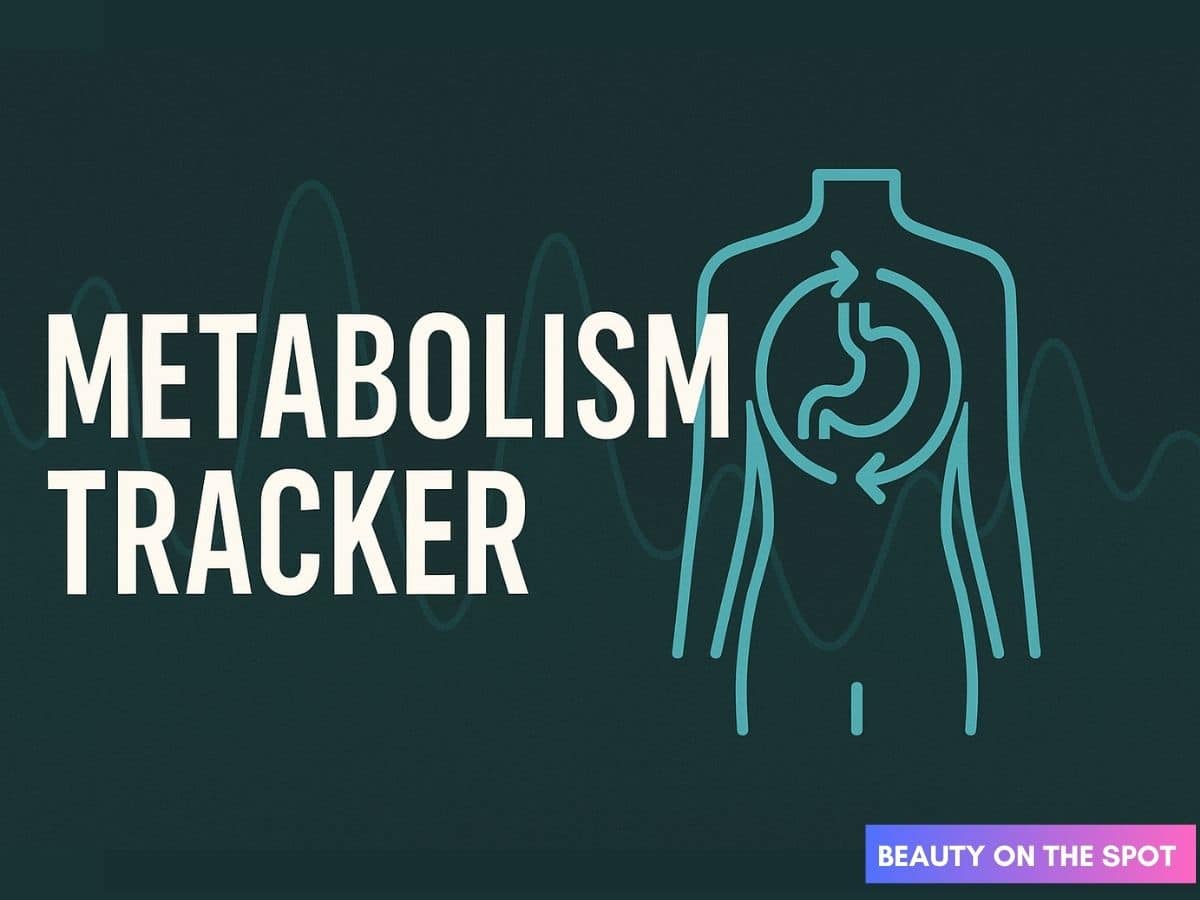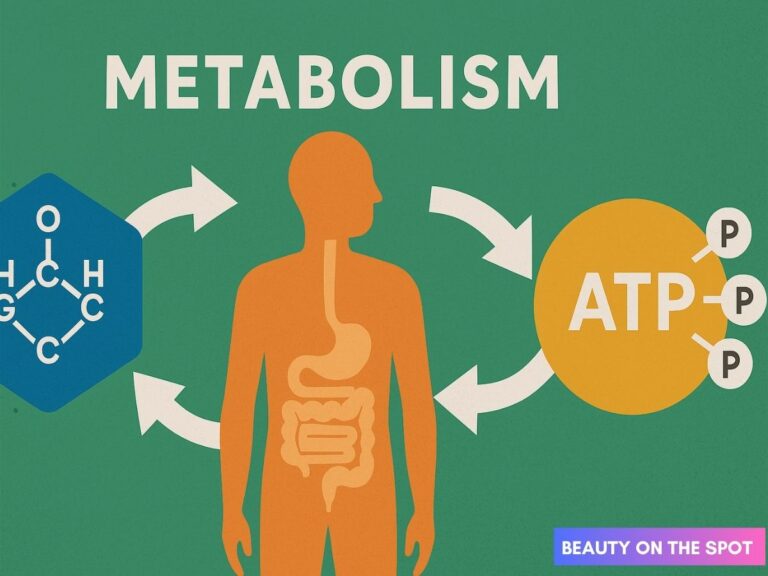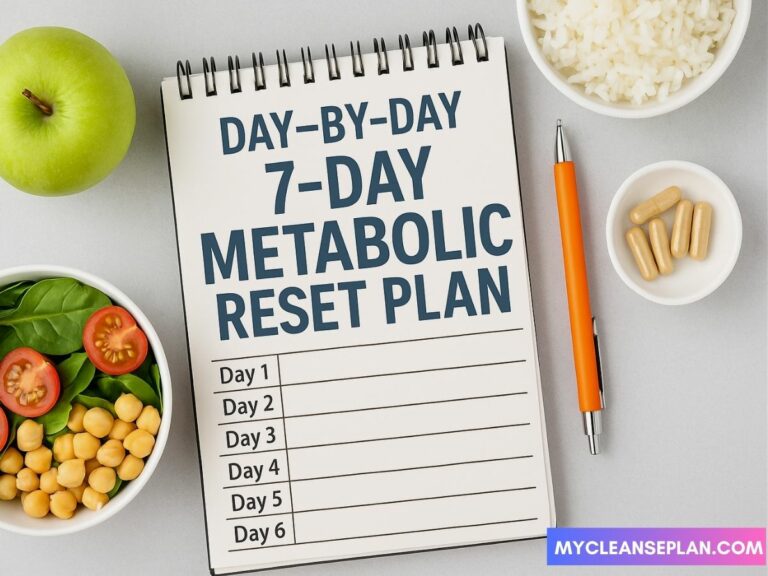How to Use a Metabolism Tracker for Better Results?
A metabolism tracker helps monitor how your body burns calories throughout the day, giving you real-time insights into energy expenditure. By using this data, you can adjust your meals, workouts, and rest for more effective fat loss, muscle gain, or energy balance.
Did you know that knowing your metabolism is key to reaching your health goals? Many people have trouble with weight and energy because they don’t understand their metabolism. Tracking your metabolism helps you see how your body uses energy.
With a metabolism tracker, you can learn about your daily energy use. This knowledge helps you make better choices about what you eat and how you exercise. It can help you manage your weight better and improve your health.
Key Takeaways

Understanding Metabolism and Why Tracking Matters

To improve metabolic health, it’s key to know what metabolism is and how it impacts us. Metabolism is how our bodies turn food into energy. It’s shaped by genetics, age, and lifestyle.
What Is Metabolism and How Does It Affect Your Health?
Metabolism is complex, breaking down nutrients to make energy. It’s vital for our health, influencing weight, energy, and overall well-being.

The Three Components of Metabolism
Metabolism has three main parts: basal metabolic rate (BMR), thermic effect of food (TEF), and physical activity level (PAL). Knowing these helps understand how your body uses energy.
- Basal Metabolic Rate (BMR): The calories your body needs at rest.
- Thermic Effect of Food (TEF): The energy to digest and process food.
- Physical Activity Level (PAL): The energy used during activity.
The Science Behind Metabolic Rate Variations
Metabolic rate changes due to genetics, age, sex, weight, and lifestyle. Knowing these factors helps understand why your rate might differ.
Factors That Influence Your Metabolic Rate
| Factor | Description | Impact on Metabolic Rate |
|---|---|---|
| Genetics | Inherited traits that affect metabolic rate | Can influence BMR |
| Age | Metabolic rate slows down with age | Decreases BMR |
| Sex | Males generally have a higher metabolic rate than females | Influences BMR |
Understanding metabolic rate factors helps improve your health. Tracking metabolism gives insights into energy needs. This helps in making better diet and exercise choices.
What Is a Metabolism Tracker?

A metabolism tracker is a tool that helps you understand your metabolic health. It tracks your body’s energy use. This device or app gives insights into how your body burns calories.
Different Types of Metabolism Tracking Devices
There are many types of metabolism trackers. You can find wearable devices, smartphone apps, and non-wearable gadgets.
Wearable devices, like smartwatches, offer constant monitoring. Smartphone apps are more affordable and easy to use.
Key Features to Look For
When choosing a metabolism tracker, look for certain features. Accuracy is key; choose devices or apps that have been tested in studies. Also, consider ease of use, data analysis, and compatibility with your devices.
| Feature | Description | Importance Level |
|---|---|---|
| Accuracy | Ability to provide precise metabolic rate measurements | High |
| Ease of Use | User-friendly interface for effortless data input and tracking | Medium |
| Data Analysis | Capability to analyze and provide insights on metabolic data | High |
| Compatibility | Ability to sync with other health and fitness devices or apps | Medium |
How Metabolism Trackers Differ from Regular Fitness Trackers
Regular fitness trackers focus on activity, heart rate, and sleep. But metabolism trackers look at more. They consider your diet, sleep, and stress to give a full picture of your health.
Choosing the Right Metabolism Tracker for Your Goals

To use metabolism data well, pick a tracker that fits your goals and likes. With many choices, picking the right one can be tough.
Budget-Friendly Options
For beginners, affordable trackers are a good start. They have basic features at a low cost. Simple pedometers or basic fitness trackers can track your daily steps.
Premium Trackers with Advanced Features
Premium trackers have cool features like heart rate and GPS tracking. They also give detailed metabolic info. Fitbit and Garmin make top models for health monitoring.
| Feature | Budget-Friendly | Premium |
|---|---|---|
| Heart Rate Monitoring | No | Yes |
| GPS Tracking | No | Yes |
| Metabolic Analysis | Basic | Detailed |
Wearable vs. Non-Wearable Options
Wearable trackers are easy to use all day. Non-wearable ones give detailed info at certain times. Think about your life when picking.
Compatibility with Your Lifestyle
Choose a tracker that works with your daily life. If you’re always moving, a wearable might be best.
By looking at these points and knowing what different trackers offer, you can pick one that helps your metabolic health.
Setting Up Your Metabolism Tracker for the First Time

To start using your metabolism tracker, the first step is key. You’ll want to begin tracking your metabolic rate right away.
Creating Your Profile and Inputting Baseline Data
First, create your profile on the device or app. You’ll need to enter your age, weight, height, and activity level. This info helps the tracker give you accurate readings. Make sure to enter it right to get the best results.
Connecting to Your Smartphone or Computer
Most trackers connect to your phone or computer via Bluetooth or Wi-Fi. Just follow the instructions to link your device. This lets you transfer data easily and see detailed analytics.
Initial Calibration Tips for Accuracy
To get precise readings, calibrate your tracker as the maker suggests. This might mean wearing it for a while or doing certain tasks.
Common Setup Mistakes to Avoid
Watch out for common errors like wrong profile data or not syncing right. Check your inputs and make sure your device is connected for top performance.
How to Use a Metabolism Tracker for Better Results

To get the most out of a metabolism tracker, you need more than just to wear it. You must have a consistent and informed plan. This means setting up a daily tracking routine, knowing the best times for measurements, and building lasting habits.
Daily Tracking Routine That Works
Having a daily routine for tracking is key to getting accurate data. Pick a specific time each day to wear your tracker and make sure it’s set up right. Being consistent is important for reliable insights into your metabolic health.
Optimal Times for Measurements
When you take measurements can affect how accurate your data is. It’s best to measure at the same time every day, like in the morning after waking up. This way, you get a baseline that’s not affected by food or exercise.
Consistency Is Key: Creating Sustainable Habits
To get the most from metabolism tracking benefits, you need to make habits that last. This includes keeping your device charged, syncing data, and checking your progress regularly. By making these actions part of your daily routine, you’re more likely to keep up with tracking.
Weekly and Monthly Check-in Protocols
Regular check-ins are important for tracking your progress and making changes. I recommend setting aside time each week to look at your data and spot any trends. Monthly check-ins help you see how you’re doing over time and adjust your plans as needed.
Interpreting Your Metabolic Data Correctly

To get the most out of your metabolism tracker, you need to know how to interpret the data it provides. This involves understanding various metrics and how they relate to your overall health and fitness goals.
Understanding Basal Metabolic Rate (BMR)
Your Basal Metabolic Rate (BMR) is a key metric. It shows the calories your body needs to function at rest. Knowing your BMR helps you tailor your diet and exercise to your needs.
BMR is influenced by factors such as age, weight, height, and sex. By knowing your BMR, you can make informed decisions about your daily caloric intake.
Analyzing Metabolic Patterns Over Time
Tracking your metabolic data over time allows you to identify patterns and trends. This helps you understand how different factors, such as diet and exercise, impact your metabolism.
By analyzing these patterns, you can adjust your lifestyle choices to optimize your metabolic health.
Red Flags to Watch For in Your Data
While tracking your metabolic data, it’s essential to watch for red flags that may indicate health issues. These can include unexpected changes in your metabolic rate or patterns that seem abnormal.
When to Consult a Healthcare Professional
If you notice any unusual patterns or significant changes in your metabolic data, it’s vital to consult with a healthcare professional. They can help you understand the implications of your data and provide guidance on the next steps.
| Metric | Normal Range | Red Flag |
|---|---|---|
| BMR | 1,200 – 2,000 calories/day | <1,000 or >2,500 calories/day |
| Metabolic Rate Variability | <10% daily variation | >20% daily variation |
Adjusting Your Diet Based on Metabolism Tracking

Changing your diet based on your metabolism tracking data is key to better health and fitness goals. Knowing how your body reacts to different foods helps you make better choices. This way, you can improve your diet.
Macronutrient Balance for Your Metabolic Type
Finding the right balance of macronutrients is important for your metabolic health. Your metabolism tracker shows how your body uses carbs, proteins, and fats.
Some people might find they burn carbs better than fats. Others might have a different metabolic type.
Meal Timing Strategies for Metabolic Efficiency
When you eat can affect your metabolism. Tracking your metabolism helps find the best times to eat to increase your metabolic rate.
Some people do better with small, frequent meals. Others prefer intermittent fasting.
Foods That Can Boost Metabolism
Some foods can help speed up your metabolism. Adding these foods to your diet can improve your metabolic health.
Creating a Personalized Nutrition Plan
To make a personalized nutrition plan, first analyze your metabolic data. This helps understand your nutritional needs.
| Metabolic Type | Recommended Macronutrient Balance | Beneficial Foods |
|---|---|---|
| Carbohydrate-Efficient | 55% Carbohydrates, 25% Protein, 20% Fat | Whole grains, fruits, and vegetables |
| Fat-Efficient | 25% Carbohydrates, 30% Protein, 45% Fat | Nuts, avocados, and fatty fish |
By following these tips and using your metabolism tracker, you can improve your metabolic health. This will help you reach your health goals more effectively.
Optimizing Exercise Routines Using Metabolic Data

Metabolic data can greatly improve your workout’s effectiveness. It shows how your body reacts to various exercises. This lets you customize your routines for the best results.
High-Intensity vs. Low-Intensity Training Effects
Knowing how exercise intensity affects your metabolism is key. High-intensity training raises your metabolic rate for hours. On the other hand, low-intensity training is better for longer, steady workouts. Mixing both can lead to the best outcomes.
- High-intensity training: Effective for burning calories post-exercise
- Low-intensity training: Suitable for longer, more sustainable workouts
Finding Your Optimal Exercise Window
Your metabolic data can show the best times to exercise. By finding your optimal exercise window, you can make your workouts more efficient.
Adjusting Workouts Based on Metabolic Feedback
Use your metabolism tracker’s data to adjust your workouts. You might change the intensity, duration, or type of exercise. This is based on how your metabolism reacts.
Building a Progressive Training Plan
To avoid plateaus, create a progressive training plan. Gradually increase the intensity or duration of your workouts. This ensures you keep making progress and avoid getting stuck.
- Monitor your metabolic response to current workouts
- Adjust intensity or duration based on feedback
- Continuously challenge yourself to achieve new goals
Tracking Sleep and Recovery for Metabolic Health

Sleep and recovery are key to a healthy metabolism. Research shows they play a big role in how our body works. Good sleep and recovery help keep our metabolism in check.
How Sleep Quality Affects Metabolism
Poor sleep can mess with our metabolism, causing insulin resistance and weight gain. But, good sleep boosts metabolic health. It helps control blood sugar and keeps weight in check. Dr. Andrew Huberman says, “Sleep is vital for metabolic health, and ignoring it can harm us a lot.”
Using Your Tracker to Improve Sleep Patterns
Modern trackers help monitor and better sleep. They track sleep duration, stages, and disruptions. This info helps us improve sleep hygiene.
Recovery Metrics That Impact Metabolic Function
Metrics like heart rate variability (HRV) and resting heart rate (RHR) are important. Trackers show how well we recover, affecting our metabolism. By watching these, we can adjust our exercise and lifestyle for better health.
Using a tracker to improve sleep and recovery is a smart way to boost metabolic health. It’s a holistic approach to better health.
Integrating Your Metabolism Tracker with Other Health Apps
To get the most out of your metabolism tracker, it’s key to link it with other health and fitness apps. This link lets you utilize metabolism data effectively and understand your health better.
Linking your metabolism tracker with health apps has many benefits. You can sync it with apps that track your food.
This way, you can see how your diet affects your metabolism. It helps you make better food choices and fuel your body right.
Syncing with Nutrition Tracking Apps
Linking your metabolism tracker with apps that track food lets you see how you eat and burn calories together.
For instance, apps like MyFitnessPal or Lose It! can connect with your tracker. This gives you a full picture of your energy use and intake.
Connecting with Fitness Platforms
Another big plus is linking your tracker with fitness apps. This lets you watch how your workouts change your metabolism.
By connecting your tracker to apps like Strava or Fitbit, you can see how different exercises impact your metabolism.
Creating a Complete Health Dashboard
By linking your metabolism tracker with health apps, you can make a complete health dashboard. This dashboard shows all your health data, like metabolic rate, diet, exercise, and sleep. Having all this info in one spot helps you spot patterns and make better health choices.
By following these metabolism tracking tips and linking your tracker with health apps, you can unlock its full power. This leads to better health results.
Overcoming Common Challenges with Metabolism Tracking
Metabolism tracking can change the game, but it comes with its own set of challenges. As you track your metabolic progress, you might face obstacles that slow you down.
Dealing with Plateaus and Data Inconsistencies
One big challenge is hitting plateaus or seeing inconsistent data. To beat this, regularly calibrate your device and make sure your info is right.
Here are some tips:
- Check for software updates
- Re-calibrate as the maker says
- Track at the same times every day
Troubleshooting Device Issues
Device problems can be really frustrating. If you’re having trouble, try restarting the device or syncing it with your smartphone. If it keeps happening, reach out to customer support.
Staying Motivated When Progress Slows
It’s normal for progress to slow down. To keep going, think about the benefits of metabolism tracking, like better health insights.
Community Support and Accountability
Being part of a community of metabolism trackers can offer great support and accountability. It helps you stay on track.
Transforming Your Health Journey with Metabolic Insights
Using a metabolism tracker has changed my health journey. It helps me understand how to use it for better results. This way, I make smart choices about my diet and exercise.
I’ve seen big improvements in my health by learning to read my metabolic data. Tracking my metabolic rate helps me spot patterns. This lets me adjust my habits for better energy, sleep, and diet.
I’ve linked my metabolism tracker with other health apps. Now, I have a complete health dashboard. This approach helps me manage my health better, making it easier to reach my goals.
Thanks to my metabolism tracker, I can refine my health plan. With the right data and knowledge, anyone can improve their health journey. It’s all about unlocking your full health and wellness.
FAQ Of How to Use a Metabolism Tracker for Better Results
What is a metabolism tracker, and how does it work?
A metabolism tracker is a device or app that watches your metabolic rate. It shows how much energy you burn. This helps you make better diet and exercise plans for health.
How often should I track my metabolism for accurate results?
To get accurate results, track your metabolism every day at the same time. This helps you see changes and keep a steady baseline.
Can a metabolism tracker help me lose weight?
Yes, a metabolism tracker can help with weight loss. It gives you data on your metabolic rate. This lets you adjust your diet and exercise for better results.
Are there different types of metabolism trackers available?
Yes, there are many types of metabolism trackers. You can find wearable devices, non-wearable devices, and mobile apps. Each has its own features and benefits.
How do I interpret the data from my metabolism tracker?
To understand your metabolism tracker data, learn about your basal metabolic rate (BMR). Look at your metabolic patterns over time. This helps you make smart choices about diet and exercise.
Can I integrate my metabolism tracker with other health apps?
Yes, many metabolism trackers work with other health apps. This creates a complete health dashboard. It gives you a full view of your health.
What are some common challenges with metabolism tracking, and how can I overcome them?
Common challenges include hitting plateaus, dealing with device issues, and staying motivated. To overcome these, stay consistent, get support, and adjust as needed.
How can I use my metabolism tracker to improve my sleep patterns?
Use your metabolism tracker to check your sleep quality. It can show you patterns that affect your metabolic health. This lets you make changes to improve your sleep and health.
Is it necessary to consult a healthcare professional when using a metabolism tracker?
While not always needed, talking to a healthcare professional is helpful. They can address concerns about your metabolic health or specific health conditions.






